Legal Analysis: Enforceability of Contract in Dagon Case Study
VerifiedAdded on 2023/06/07
|8
|2074
|102
Case Study
AI Summary
This case study delves into a contract dispute between Dagon and the Congregation of the Cthulhu Mythos Pty Ltd, examining whether a legally binding and enforceable contract exists and if Dagon breached its terms. The analysis covers essential elements of contract law, including offer, acceptance, intention to create legal relations, and consideration. It applies relevant legal principles and case precedents to determine the enforceability of the contract, specifically addressing issues such as the failure to charge for plastic bags and the omission of making an offering to Azathoth. The study concludes that a valid contract existed, and Dagon's breaches, particularly the failure to offer sacrifices, constituted a breach of a condition, warranting the termination of the contract by Cthulhu Mythos Pty Ltd. The document provides a comprehensive legal analysis supported by relevant case law and academic references.
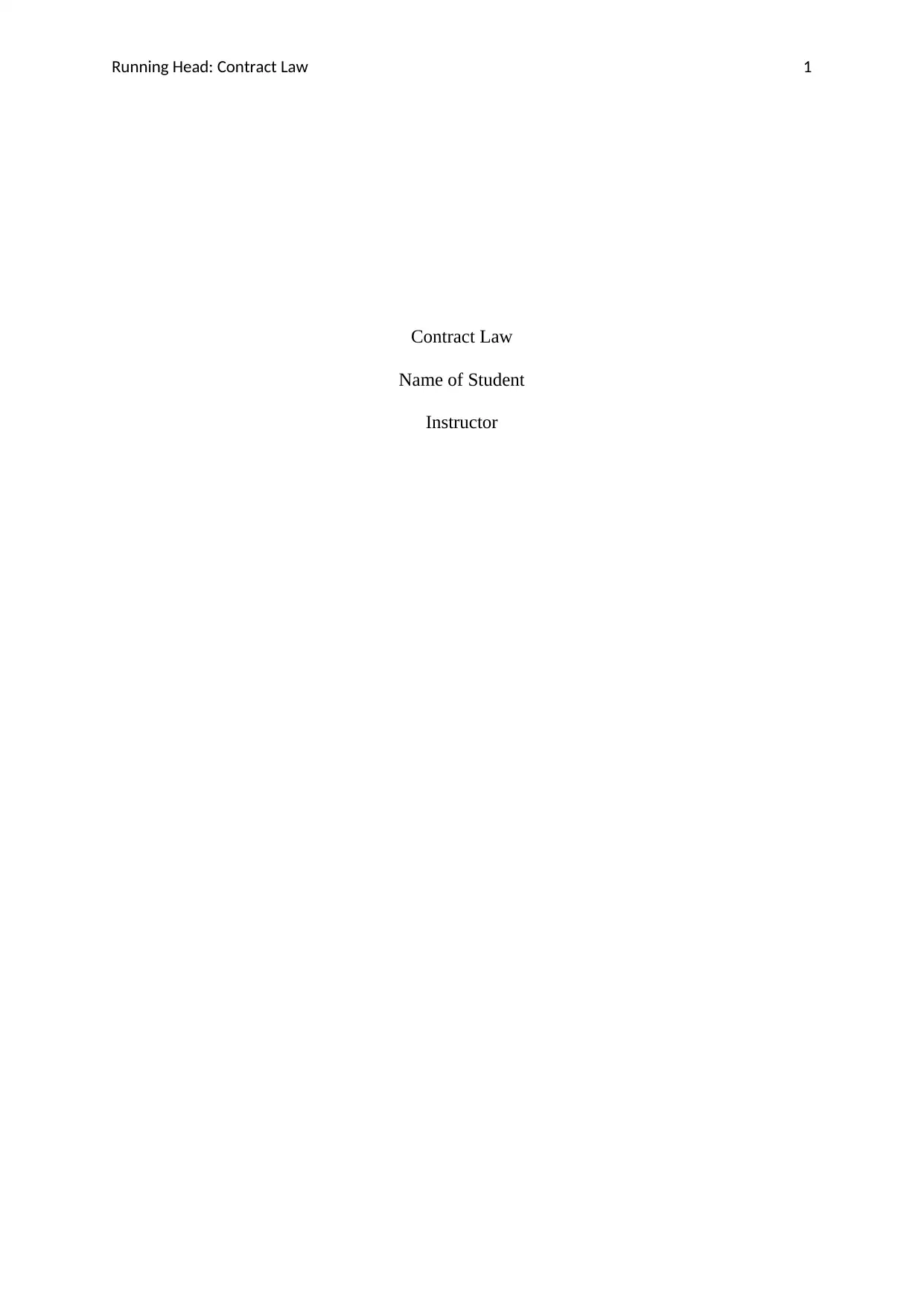
Running Head: Contract Law 1
Contract Law
Name of Student
Instructor
Contract Law
Name of Student
Instructor
Secure Best Marks with AI Grader
Need help grading? Try our AI Grader for instant feedback on your assignments.
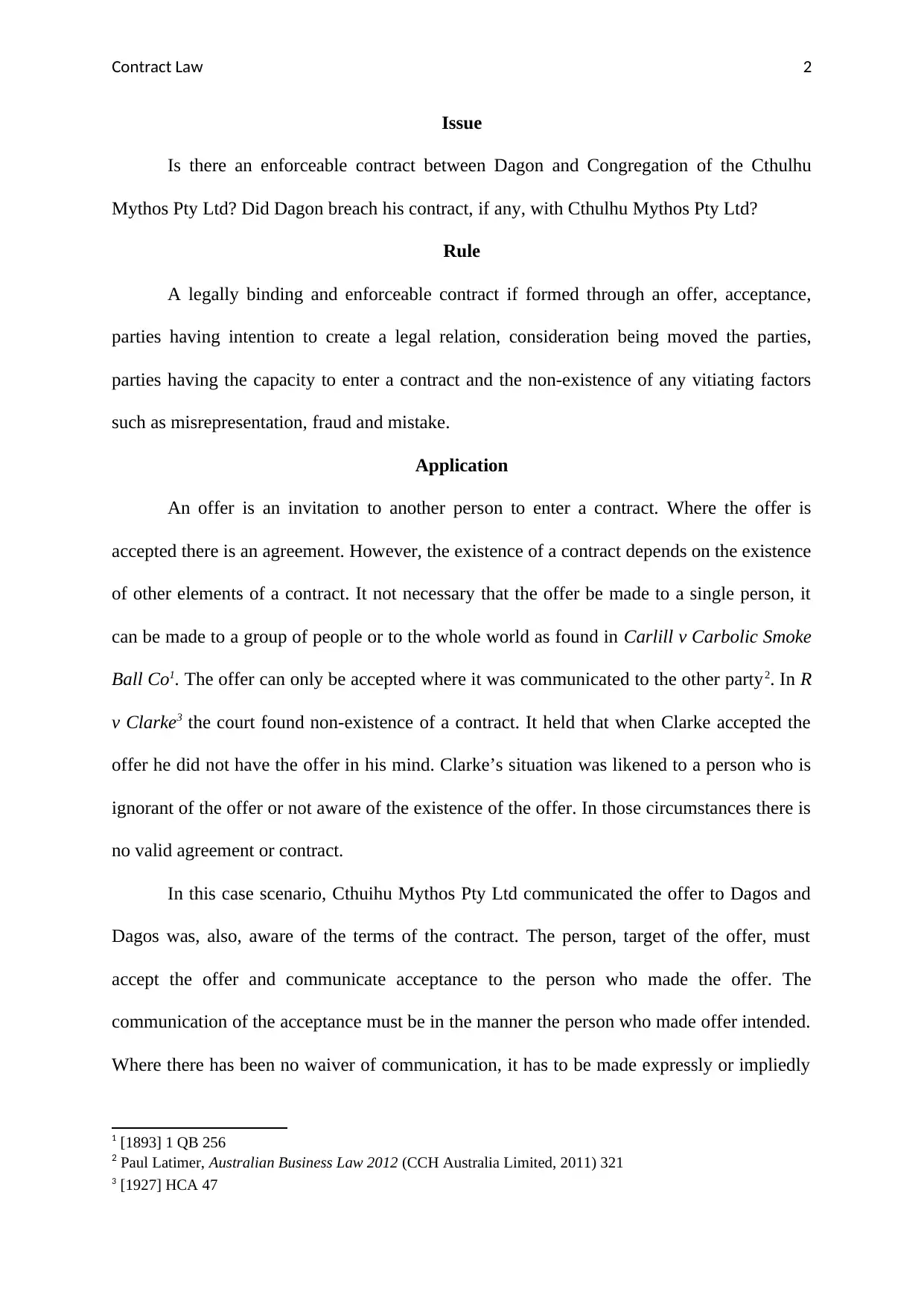
Contract Law 2
Issue
Is there an enforceable contract between Dagon and Congregation of the Cthulhu
Mythos Pty Ltd? Did Dagon breach his contract, if any, with Cthulhu Mythos Pty Ltd?
Rule
A legally binding and enforceable contract if formed through an offer, acceptance,
parties having intention to create a legal relation, consideration being moved the parties,
parties having the capacity to enter a contract and the non-existence of any vitiating factors
such as misrepresentation, fraud and mistake.
Application
An offer is an invitation to another person to enter a contract. Where the offer is
accepted there is an agreement. However, the existence of a contract depends on the existence
of other elements of a contract. It not necessary that the offer be made to a single person, it
can be made to a group of people or to the whole world as found in Carlill v Carbolic Smoke
Ball Co1. The offer can only be accepted where it was communicated to the other party2. In R
v Clarke3 the court found non-existence of a contract. It held that when Clarke accepted the
offer he did not have the offer in his mind. Clarke’s situation was likened to a person who is
ignorant of the offer or not aware of the existence of the offer. In those circumstances there is
no valid agreement or contract.
In this case scenario, Cthuihu Mythos Pty Ltd communicated the offer to Dagos and
Dagos was, also, aware of the terms of the contract. The person, target of the offer, must
accept the offer and communicate acceptance to the person who made the offer. The
communication of the acceptance must be in the manner the person who made offer intended.
Where there has been no waiver of communication, it has to be made expressly or impliedly
1 [1893] 1 QB 256
2 Paul Latimer, Australian Business Law 2012 (CCH Australia Limited, 2011) 321
3 [1927] HCA 47
Issue
Is there an enforceable contract between Dagon and Congregation of the Cthulhu
Mythos Pty Ltd? Did Dagon breach his contract, if any, with Cthulhu Mythos Pty Ltd?
Rule
A legally binding and enforceable contract if formed through an offer, acceptance,
parties having intention to create a legal relation, consideration being moved the parties,
parties having the capacity to enter a contract and the non-existence of any vitiating factors
such as misrepresentation, fraud and mistake.
Application
An offer is an invitation to another person to enter a contract. Where the offer is
accepted there is an agreement. However, the existence of a contract depends on the existence
of other elements of a contract. It not necessary that the offer be made to a single person, it
can be made to a group of people or to the whole world as found in Carlill v Carbolic Smoke
Ball Co1. The offer can only be accepted where it was communicated to the other party2. In R
v Clarke3 the court found non-existence of a contract. It held that when Clarke accepted the
offer he did not have the offer in his mind. Clarke’s situation was likened to a person who is
ignorant of the offer or not aware of the existence of the offer. In those circumstances there is
no valid agreement or contract.
In this case scenario, Cthuihu Mythos Pty Ltd communicated the offer to Dagos and
Dagos was, also, aware of the terms of the contract. The person, target of the offer, must
accept the offer and communicate acceptance to the person who made the offer. The
communication of the acceptance must be in the manner the person who made offer intended.
Where there has been no waiver of communication, it has to be made expressly or impliedly
1 [1893] 1 QB 256
2 Paul Latimer, Australian Business Law 2012 (CCH Australia Limited, 2011) 321
3 [1927] HCA 47
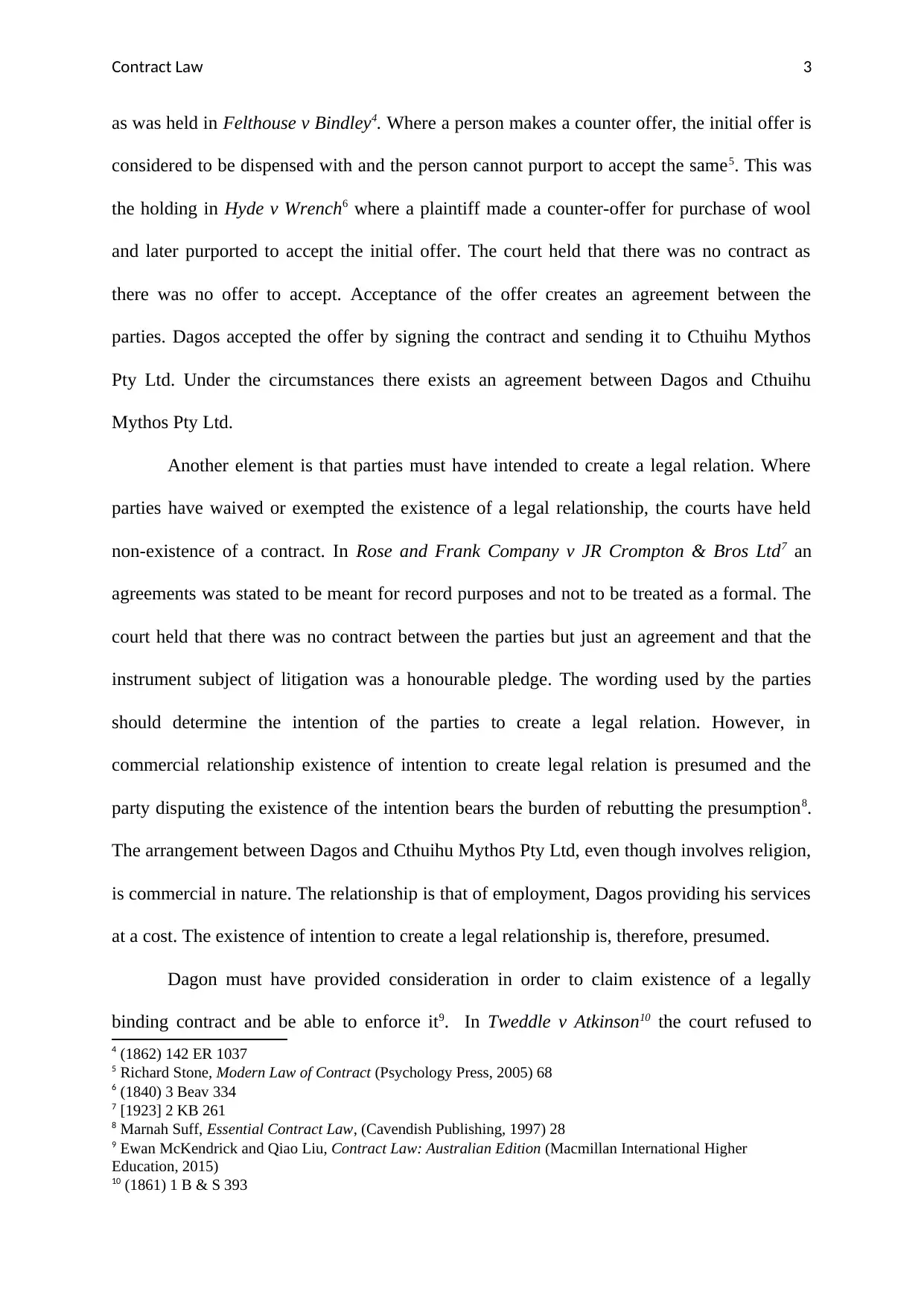
Contract Law 3
as was held in Felthouse v Bindley4. Where a person makes a counter offer, the initial offer is
considered to be dispensed with and the person cannot purport to accept the same5. This was
the holding in Hyde v Wrench6 where a plaintiff made a counter-offer for purchase of wool
and later purported to accept the initial offer. The court held that there was no contract as
there was no offer to accept. Acceptance of the offer creates an agreement between the
parties. Dagos accepted the offer by signing the contract and sending it to Cthuihu Mythos
Pty Ltd. Under the circumstances there exists an agreement between Dagos and Cthuihu
Mythos Pty Ltd.
Another element is that parties must have intended to create a legal relation. Where
parties have waived or exempted the existence of a legal relationship, the courts have held
non-existence of a contract. In Rose and Frank Company v JR Crompton & Bros Ltd7 an
agreements was stated to be meant for record purposes and not to be treated as a formal. The
court held that there was no contract between the parties but just an agreement and that the
instrument subject of litigation was a honourable pledge. The wording used by the parties
should determine the intention of the parties to create a legal relation. However, in
commercial relationship existence of intention to create legal relation is presumed and the
party disputing the existence of the intention bears the burden of rebutting the presumption8.
The arrangement between Dagos and Cthuihu Mythos Pty Ltd, even though involves religion,
is commercial in nature. The relationship is that of employment, Dagos providing his services
at a cost. The existence of intention to create a legal relationship is, therefore, presumed.
Dagon must have provided consideration in order to claim existence of a legally
binding contract and be able to enforce it9. In Tweddle v Atkinson10 the court refused to
4 (1862) 142 ER 1037
5 Richard Stone, Modern Law of Contract (Psychology Press, 2005) 68
6 (1840) 3 Beav 334
7 [1923] 2 KB 261
8 Marnah Suff, Essential Contract Law, (Cavendish Publishing, 1997) 28
9 Ewan McKendrick and Qiao Liu, Contract Law: Australian Edition (Macmillan International Higher
Education, 2015)
10 (1861) 1 B & S 393
as was held in Felthouse v Bindley4. Where a person makes a counter offer, the initial offer is
considered to be dispensed with and the person cannot purport to accept the same5. This was
the holding in Hyde v Wrench6 where a plaintiff made a counter-offer for purchase of wool
and later purported to accept the initial offer. The court held that there was no contract as
there was no offer to accept. Acceptance of the offer creates an agreement between the
parties. Dagos accepted the offer by signing the contract and sending it to Cthuihu Mythos
Pty Ltd. Under the circumstances there exists an agreement between Dagos and Cthuihu
Mythos Pty Ltd.
Another element is that parties must have intended to create a legal relation. Where
parties have waived or exempted the existence of a legal relationship, the courts have held
non-existence of a contract. In Rose and Frank Company v JR Crompton & Bros Ltd7 an
agreements was stated to be meant for record purposes and not to be treated as a formal. The
court held that there was no contract between the parties but just an agreement and that the
instrument subject of litigation was a honourable pledge. The wording used by the parties
should determine the intention of the parties to create a legal relation. However, in
commercial relationship existence of intention to create legal relation is presumed and the
party disputing the existence of the intention bears the burden of rebutting the presumption8.
The arrangement between Dagos and Cthuihu Mythos Pty Ltd, even though involves religion,
is commercial in nature. The relationship is that of employment, Dagos providing his services
at a cost. The existence of intention to create a legal relationship is, therefore, presumed.
Dagon must have provided consideration in order to claim existence of a legally
binding contract and be able to enforce it9. In Tweddle v Atkinson10 the court refused to
4 (1862) 142 ER 1037
5 Richard Stone, Modern Law of Contract (Psychology Press, 2005) 68
6 (1840) 3 Beav 334
7 [1923] 2 KB 261
8 Marnah Suff, Essential Contract Law, (Cavendish Publishing, 1997) 28
9 Ewan McKendrick and Qiao Liu, Contract Law: Australian Edition (Macmillan International Higher
Education, 2015)
10 (1861) 1 B & S 393
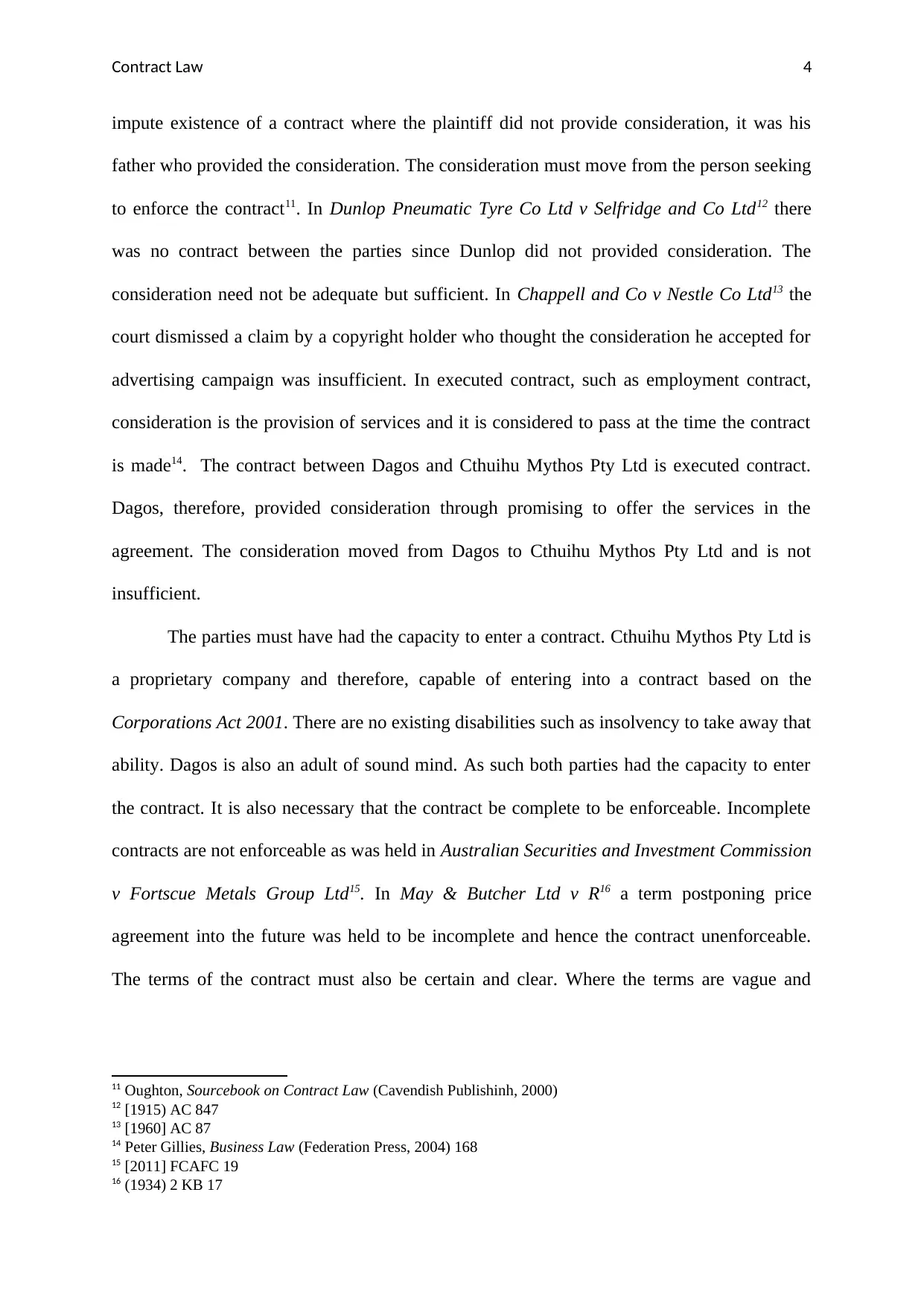
Contract Law 4
impute existence of a contract where the plaintiff did not provide consideration, it was his
father who provided the consideration. The consideration must move from the person seeking
to enforce the contract11. In Dunlop Pneumatic Tyre Co Ltd v Selfridge and Co Ltd12 there
was no contract between the parties since Dunlop did not provided consideration. The
consideration need not be adequate but sufficient. In Chappell and Co v Nestle Co Ltd13 the
court dismissed a claim by a copyright holder who thought the consideration he accepted for
advertising campaign was insufficient. In executed contract, such as employment contract,
consideration is the provision of services and it is considered to pass at the time the contract
is made14. The contract between Dagos and Cthuihu Mythos Pty Ltd is executed contract.
Dagos, therefore, provided consideration through promising to offer the services in the
agreement. The consideration moved from Dagos to Cthuihu Mythos Pty Ltd and is not
insufficient.
The parties must have had the capacity to enter a contract. Cthuihu Mythos Pty Ltd is
a proprietary company and therefore, capable of entering into a contract based on the
Corporations Act 2001. There are no existing disabilities such as insolvency to take away that
ability. Dagos is also an adult of sound mind. As such both parties had the capacity to enter
the contract. It is also necessary that the contract be complete to be enforceable. Incomplete
contracts are not enforceable as was held in Australian Securities and Investment Commission
v Fortscue Metals Group Ltd15. In May & Butcher Ltd v R16 a term postponing price
agreement into the future was held to be incomplete and hence the contract unenforceable.
The terms of the contract must also be certain and clear. Where the terms are vague and
11 Oughton, Sourcebook on Contract Law (Cavendish Publishinh, 2000)
12 [1915) AC 847
13 [1960] AC 87
14 Peter Gillies, Business Law (Federation Press, 2004) 168
15 [2011] FCAFC 19
16 (1934) 2 KB 17
impute existence of a contract where the plaintiff did not provide consideration, it was his
father who provided the consideration. The consideration must move from the person seeking
to enforce the contract11. In Dunlop Pneumatic Tyre Co Ltd v Selfridge and Co Ltd12 there
was no contract between the parties since Dunlop did not provided consideration. The
consideration need not be adequate but sufficient. In Chappell and Co v Nestle Co Ltd13 the
court dismissed a claim by a copyright holder who thought the consideration he accepted for
advertising campaign was insufficient. In executed contract, such as employment contract,
consideration is the provision of services and it is considered to pass at the time the contract
is made14. The contract between Dagos and Cthuihu Mythos Pty Ltd is executed contract.
Dagos, therefore, provided consideration through promising to offer the services in the
agreement. The consideration moved from Dagos to Cthuihu Mythos Pty Ltd and is not
insufficient.
The parties must have had the capacity to enter a contract. Cthuihu Mythos Pty Ltd is
a proprietary company and therefore, capable of entering into a contract based on the
Corporations Act 2001. There are no existing disabilities such as insolvency to take away that
ability. Dagos is also an adult of sound mind. As such both parties had the capacity to enter
the contract. It is also necessary that the contract be complete to be enforceable. Incomplete
contracts are not enforceable as was held in Australian Securities and Investment Commission
v Fortscue Metals Group Ltd15. In May & Butcher Ltd v R16 a term postponing price
agreement into the future was held to be incomplete and hence the contract unenforceable.
The terms of the contract must also be certain and clear. Where the terms are vague and
11 Oughton, Sourcebook on Contract Law (Cavendish Publishinh, 2000)
12 [1915) AC 847
13 [1960] AC 87
14 Peter Gillies, Business Law (Federation Press, 2004) 168
15 [2011] FCAFC 19
16 (1934) 2 KB 17
Secure Best Marks with AI Grader
Need help grading? Try our AI Grader for instant feedback on your assignments.
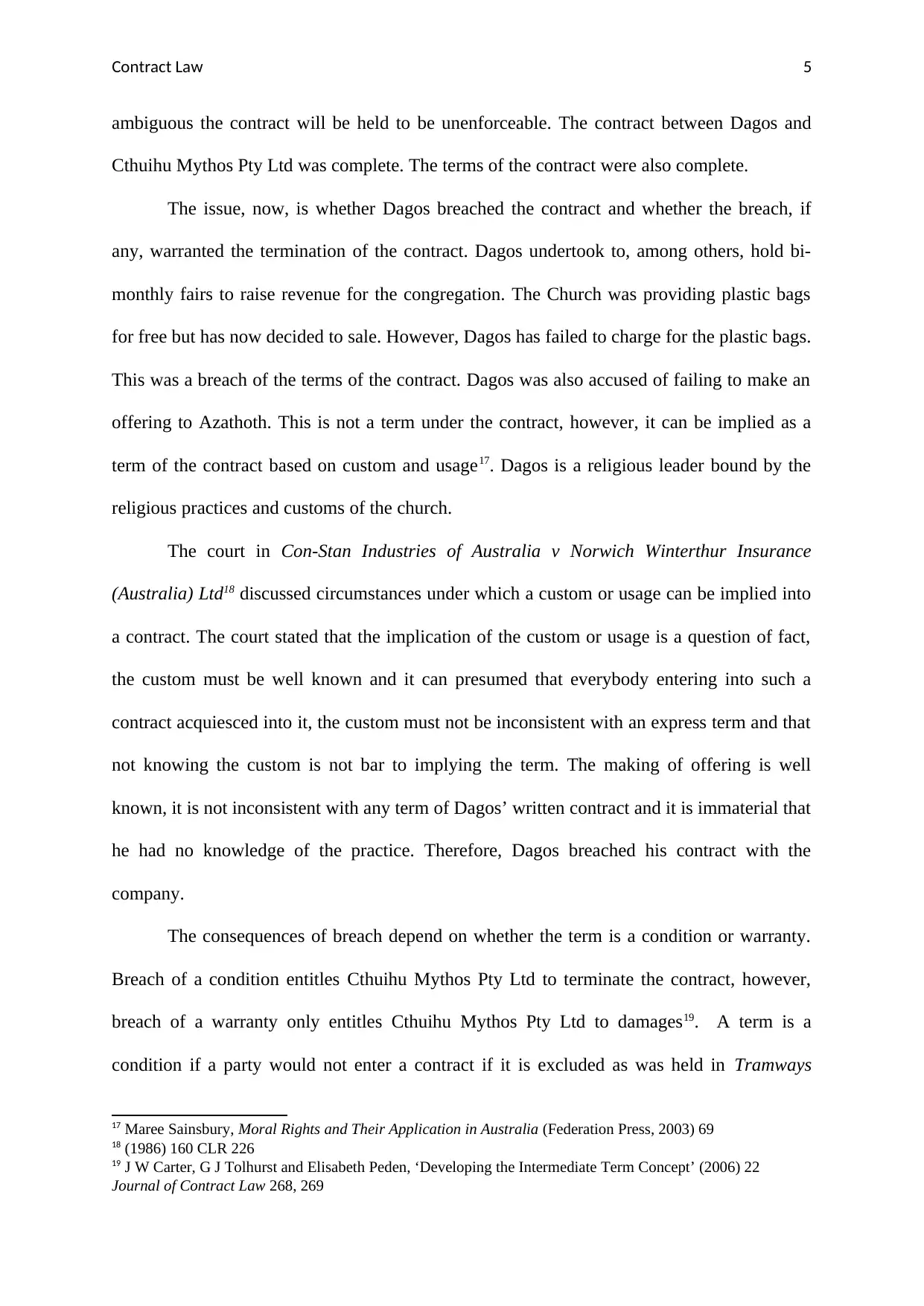
Contract Law 5
ambiguous the contract will be held to be unenforceable. The contract between Dagos and
Cthuihu Mythos Pty Ltd was complete. The terms of the contract were also complete.
The issue, now, is whether Dagos breached the contract and whether the breach, if
any, warranted the termination of the contract. Dagos undertook to, among others, hold bi-
monthly fairs to raise revenue for the congregation. The Church was providing plastic bags
for free but has now decided to sale. However, Dagos has failed to charge for the plastic bags.
This was a breach of the terms of the contract. Dagos was also accused of failing to make an
offering to Azathoth. This is not a term under the contract, however, it can be implied as a
term of the contract based on custom and usage17. Dagos is a religious leader bound by the
religious practices and customs of the church.
The court in Con-Stan Industries of Australia v Norwich Winterthur Insurance
(Australia) Ltd18 discussed circumstances under which a custom or usage can be implied into
a contract. The court stated that the implication of the custom or usage is a question of fact,
the custom must be well known and it can presumed that everybody entering into such a
contract acquiesced into it, the custom must not be inconsistent with an express term and that
not knowing the custom is not bar to implying the term. The making of offering is well
known, it is not inconsistent with any term of Dagos’ written contract and it is immaterial that
he had no knowledge of the practice. Therefore, Dagos breached his contract with the
company.
The consequences of breach depend on whether the term is a condition or warranty.
Breach of a condition entitles Cthuihu Mythos Pty Ltd to terminate the contract, however,
breach of a warranty only entitles Cthuihu Mythos Pty Ltd to damages19. A term is a
condition if a party would not enter a contract if it is excluded as was held in Tramways
17 Maree Sainsbury, Moral Rights and Their Application in Australia (Federation Press, 2003) 69
18 (1986) 160 CLR 226
19 J W Carter, G J Tolhurst and Elisabeth Peden, ‘Developing the Intermediate Term Concept’ (2006) 22
Journal of Contract Law 268, 269
ambiguous the contract will be held to be unenforceable. The contract between Dagos and
Cthuihu Mythos Pty Ltd was complete. The terms of the contract were also complete.
The issue, now, is whether Dagos breached the contract and whether the breach, if
any, warranted the termination of the contract. Dagos undertook to, among others, hold bi-
monthly fairs to raise revenue for the congregation. The Church was providing plastic bags
for free but has now decided to sale. However, Dagos has failed to charge for the plastic bags.
This was a breach of the terms of the contract. Dagos was also accused of failing to make an
offering to Azathoth. This is not a term under the contract, however, it can be implied as a
term of the contract based on custom and usage17. Dagos is a religious leader bound by the
religious practices and customs of the church.
The court in Con-Stan Industries of Australia v Norwich Winterthur Insurance
(Australia) Ltd18 discussed circumstances under which a custom or usage can be implied into
a contract. The court stated that the implication of the custom or usage is a question of fact,
the custom must be well known and it can presumed that everybody entering into such a
contract acquiesced into it, the custom must not be inconsistent with an express term and that
not knowing the custom is not bar to implying the term. The making of offering is well
known, it is not inconsistent with any term of Dagos’ written contract and it is immaterial that
he had no knowledge of the practice. Therefore, Dagos breached his contract with the
company.
The consequences of breach depend on whether the term is a condition or warranty.
Breach of a condition entitles Cthuihu Mythos Pty Ltd to terminate the contract, however,
breach of a warranty only entitles Cthuihu Mythos Pty Ltd to damages19. A term is a
condition if a party would not enter a contract if it is excluded as was held in Tramways
17 Maree Sainsbury, Moral Rights and Their Application in Australia (Federation Press, 2003) 69
18 (1986) 160 CLR 226
19 J W Carter, G J Tolhurst and Elisabeth Peden, ‘Developing the Intermediate Term Concept’ (2006) 22
Journal of Contract Law 268, 269
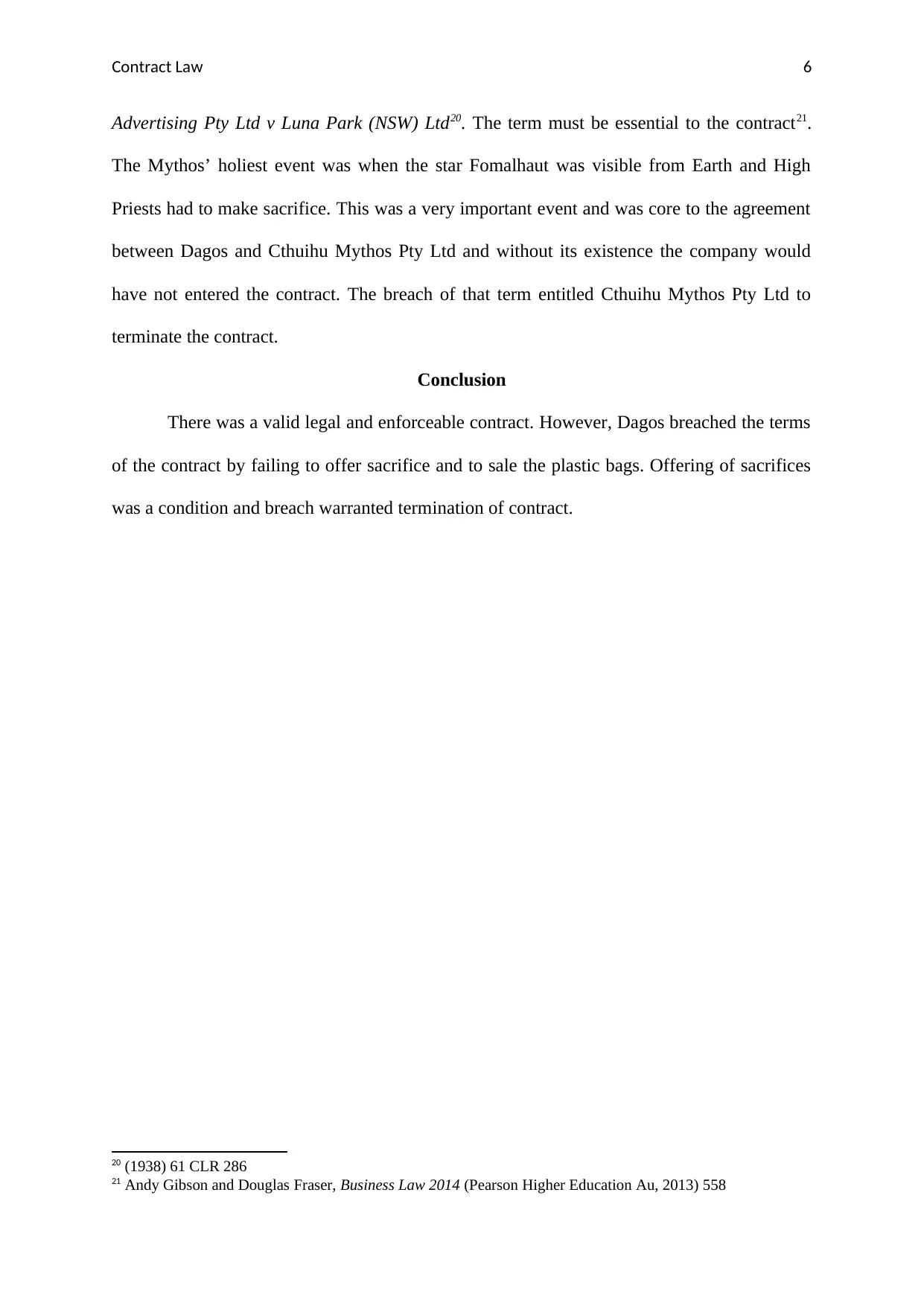
Contract Law 6
Advertising Pty Ltd v Luna Park (NSW) Ltd20. The term must be essential to the contract21.
The Mythos’ holiest event was when the star Fomalhaut was visible from Earth and High
Priests had to make sacrifice. This was a very important event and was core to the agreement
between Dagos and Cthuihu Mythos Pty Ltd and without its existence the company would
have not entered the contract. The breach of that term entitled Cthuihu Mythos Pty Ltd to
terminate the contract.
Conclusion
There was a valid legal and enforceable contract. However, Dagos breached the terms
of the contract by failing to offer sacrifice and to sale the plastic bags. Offering of sacrifices
was a condition and breach warranted termination of contract.
20 (1938) 61 CLR 286
21 Andy Gibson and Douglas Fraser, Business Law 2014 (Pearson Higher Education Au, 2013) 558
Advertising Pty Ltd v Luna Park (NSW) Ltd20. The term must be essential to the contract21.
The Mythos’ holiest event was when the star Fomalhaut was visible from Earth and High
Priests had to make sacrifice. This was a very important event and was core to the agreement
between Dagos and Cthuihu Mythos Pty Ltd and without its existence the company would
have not entered the contract. The breach of that term entitled Cthuihu Mythos Pty Ltd to
terminate the contract.
Conclusion
There was a valid legal and enforceable contract. However, Dagos breached the terms
of the contract by failing to offer sacrifice and to sale the plastic bags. Offering of sacrifices
was a condition and breach warranted termination of contract.
20 (1938) 61 CLR 286
21 Andy Gibson and Douglas Fraser, Business Law 2014 (Pearson Higher Education Au, 2013) 558
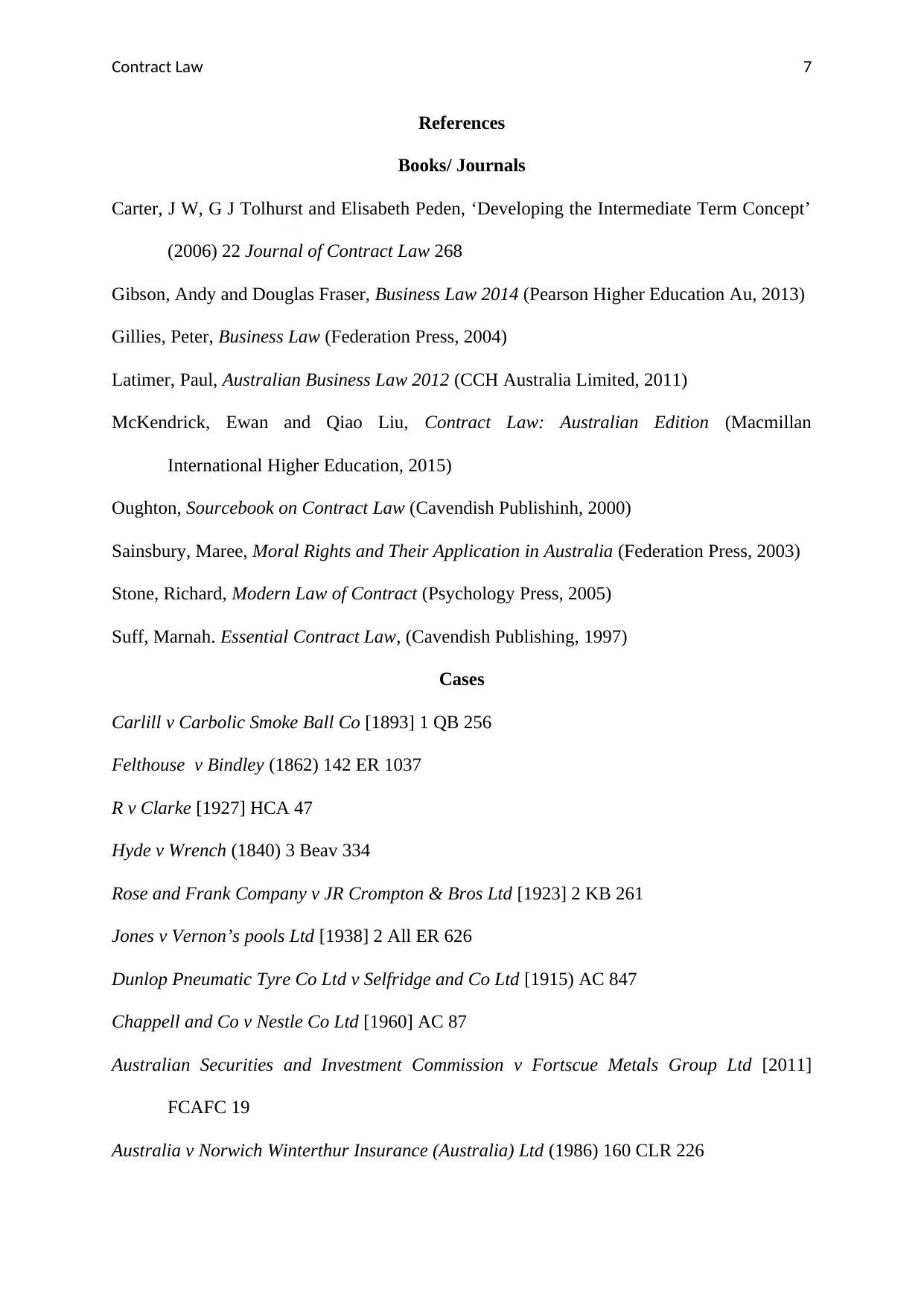
Contract Law 7
References
Books/ Journals
Carter, J W, G J Tolhurst and Elisabeth Peden, ‘Developing the Intermediate Term Concept’
(2006) 22 Journal of Contract Law 268
Gibson, Andy and Douglas Fraser, Business Law 2014 (Pearson Higher Education Au, 2013)
Gillies, Peter, Business Law (Federation Press, 2004)
Latimer, Paul, Australian Business Law 2012 (CCH Australia Limited, 2011)
McKendrick, Ewan and Qiao Liu, Contract Law: Australian Edition (Macmillan
International Higher Education, 2015)
Oughton, Sourcebook on Contract Law (Cavendish Publishinh, 2000)
Sainsbury, Maree, Moral Rights and Their Application in Australia (Federation Press, 2003)
Stone, Richard, Modern Law of Contract (Psychology Press, 2005)
Suff, Marnah. Essential Contract Law, (Cavendish Publishing, 1997)
Cases
Carlill v Carbolic Smoke Ball Co [1893] 1 QB 256
Felthouse v Bindley (1862) 142 ER 1037
R v Clarke [1927] HCA 47
Hyde v Wrench (1840) 3 Beav 334
Rose and Frank Company v JR Crompton & Bros Ltd [1923] 2 KB 261
Jones v Vernon’s pools Ltd [1938] 2 All ER 626
Dunlop Pneumatic Tyre Co Ltd v Selfridge and Co Ltd [1915) AC 847
Chappell and Co v Nestle Co Ltd [1960] AC 87
Australian Securities and Investment Commission v Fortscue Metals Group Ltd [2011]
FCAFC 19
Australia v Norwich Winterthur Insurance (Australia) Ltd (1986) 160 CLR 226
References
Books/ Journals
Carter, J W, G J Tolhurst and Elisabeth Peden, ‘Developing the Intermediate Term Concept’
(2006) 22 Journal of Contract Law 268
Gibson, Andy and Douglas Fraser, Business Law 2014 (Pearson Higher Education Au, 2013)
Gillies, Peter, Business Law (Federation Press, 2004)
Latimer, Paul, Australian Business Law 2012 (CCH Australia Limited, 2011)
McKendrick, Ewan and Qiao Liu, Contract Law: Australian Edition (Macmillan
International Higher Education, 2015)
Oughton, Sourcebook on Contract Law (Cavendish Publishinh, 2000)
Sainsbury, Maree, Moral Rights and Their Application in Australia (Federation Press, 2003)
Stone, Richard, Modern Law of Contract (Psychology Press, 2005)
Suff, Marnah. Essential Contract Law, (Cavendish Publishing, 1997)
Cases
Carlill v Carbolic Smoke Ball Co [1893] 1 QB 256
Felthouse v Bindley (1862) 142 ER 1037
R v Clarke [1927] HCA 47
Hyde v Wrench (1840) 3 Beav 334
Rose and Frank Company v JR Crompton & Bros Ltd [1923] 2 KB 261
Jones v Vernon’s pools Ltd [1938] 2 All ER 626
Dunlop Pneumatic Tyre Co Ltd v Selfridge and Co Ltd [1915) AC 847
Chappell and Co v Nestle Co Ltd [1960] AC 87
Australian Securities and Investment Commission v Fortscue Metals Group Ltd [2011]
FCAFC 19
Australia v Norwich Winterthur Insurance (Australia) Ltd (1986) 160 CLR 226
Paraphrase This Document
Need a fresh take? Get an instant paraphrase of this document with our AI Paraphraser

Contract Law 8
Tramways Advertising Pty Ltd v Luna Park (NSW) Ltd (1938) 61 CLR 286
Tramways Advertising Pty Ltd v Luna Park (NSW) Ltd (1938) 61 CLR 286
1 out of 8
Related Documents
Your All-in-One AI-Powered Toolkit for Academic Success.
+13062052269
info@desklib.com
Available 24*7 on WhatsApp / Email
![[object Object]](/_next/static/media/star-bottom.7253800d.svg)
Unlock your academic potential
© 2024 | Zucol Services PVT LTD | All rights reserved.





